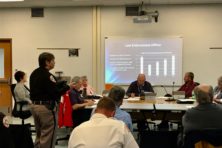Reps in the News: School Resource Officers, PTSD Coverage Act
- Share
- Tweet
- Pin
- Share
Representative Joel Kitchens
Rep. Joel Kitchen praised the work of school resource officers in preventing more tragedy after a series of shootings and threats of violence at Wisconsin schools last week:
“While we can consider ourselves fortunate that none of these situations resulted in a loss of life, the truth is things could have turned out much differently,” Kitchens said in a statement. “But because of the quick and heroic actions of the two resource officers, the students in those two schools are safe and still alive.”
Kitchens noted that nearly all Door County schools now have such officers, which helps to forge bonds between police and students.
“Although they can be viewed as authoritative figures, successful school resource officers foster close and personal relationships with our students. Because of those connections, students are much more likely to seek out their school resource officer when they are experiencing problems or notice that their peers are struggling.”
In November Republican leadership in the state senate and state assembly refused to discuss gun safety proposals in a special session of the legislature called by Governor Tony Evers. Kitchens called the special session a “political maneuver.”
“I don’t want to just pass something just to say we did something,” Kitchens said.
Senator Andre Jacque
Sen. Andre Jacque introduced a bill to allow first responders to receive treatment for work-related post-traumatic stress disorder (PTSD).
“With increasing suicide rates for first responders suffering from PTSD, there is a general consensus that something needs to be done,” Jacque said.
The Public Safety PTSD Coverage Act would clarify the conditions of liability for worker’s compensation benefits for a law enforcement officer or a firefighter who is diagnosed with PTSD to ensure the coverage they need is received.
Jacque said the legislation would pave the way for law enforcement officers and firefighters to admit they need help and get that help through their insurance plan.
“It just makes sense for us to help protect our protectors,” Jacque said. “Right now, if you’re shot, you have coverage. But if your partner gets shot you don’t have coverage to deal with the trauma of that.”
Jacque said the insurance industry has held the bill up in past sessions due to the fear of an explosion in claims, but he said other states have not seen a significant increase in costs with similar legislation.

